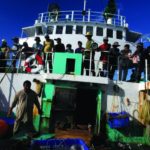
DNV Joins With Flag And Class Leaders To Launch Maritime Technologies Forum
April 26, 2021
IMO Releases Fourth Greenhouse Gas Study 2020
April 27, 2021
The Seafood Working Group (SWG) of which 28 member organisations, including Human Rights at Sea, has issued a collective critical statement as to the current standing of the industry-led Fairness, Integrity, Safety and Health (FISH) Standard for Crew highlighting the key weaknesses which will prevent it being an effective tool to address human and labour rights abuses for fishers.
As noted in a covering statement issued by the International Labour Rights Forum (ILRF); “The Seafood Working Group cautions retailers and global buyers of seafood that the Fairness, Integrity, Safety and Health (FISH) Standard for Crew will not serve as a legitimate or effective mechanism for the identification of labor abuse on fishing vessels in seafood supply chains.”
As part of the review, Human Rights at Sea submitted a number of drafting contributions to the final text which focused on multiple areas of concern requiring to be addressed. These were non-exhaustive when addressing the scope and effectiveness of the increasing numbers of private standards which focus on sustainability, conservation, human and labour rights matters.
As highlighted by the SWG statement, the shortcomings demonstrate a lack of due consideration for key factors which the SWG say need to be addressed. These include:
- No meaningful role for workers and/or their representatives
- An ineffective mechanism for identifying labor abuse on fishing vessels (i.e. an audit)
- No commitment to remediate workers
- No chain of custody mechanism
- Selective application of international standards
- Default to national legal frameworks that may be weaker than international standards
- Failure to recognize power imbalance between employers and fishers
- Conflict of interest at multiple levels that undermine rigorous application of the Standard
Human Rights at Sea focus areas
Human Rights at Sea continues to constantly press for alignment and explicit public policy statements from entities involved in such private standards to confirm that they are acting in accordance with established international human and labour rights standards at all times. This also includes for all Fishery Improvement Projects (FIPs).
In addition; that transparent mechanisms in place for recording, tracking and investigating incidents of alleged or actual abuse towards workers at sea including for sustainability standards and international accreditation marks.
This requires worker access to effective remedy and remediation in the case of incidents of abuse and third-party auditing awareness of the signs and indicators of human and labour rights abuse, such as the ILO Indicators of Forced Labour.
Such a proactive approach should be further reinforced with voluntary, though emerging national legislative requirements, for mandatory Human Rights Due Diligence (HRDD) reflecting application of the 2011 UN Guiding Principles on Business and Human Rights to be combined with access to, and due consideration of, workers’ voice from the front end of the supply chain.
Human Rights Due Diligence: Core Principles
The ultimate objective of human rights due diligence (HRDD) is to prevent adverse impacts on people. According to the United Nations Guiding Principles on Business and Human Rights (UNGPs) – the globally recognised framework for the duties of businesses to prevent adverse impacts on people – HRDD involves four key components:
- Identifying and assessing actual or potential adverse human rights impacts that a business may cause or contribute to through its own activities, or which may be directly linked to its operations, products or services by its business relationships;
- Taking appropriate action on findings from impact assessments;
- Tracking the effectiveness of measures taken to address adverse human rights impacts; and
- Communicating how impacts are being addressed and showing stakeholders – in particular, affected stakeholders – that adequate policies and processes are in place.
Press Release
Source: Maritime Shipping News



